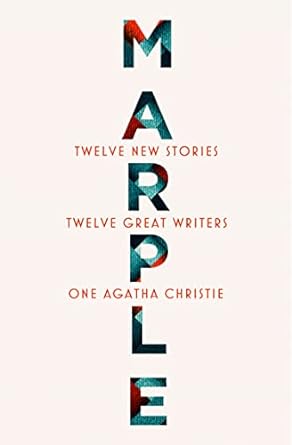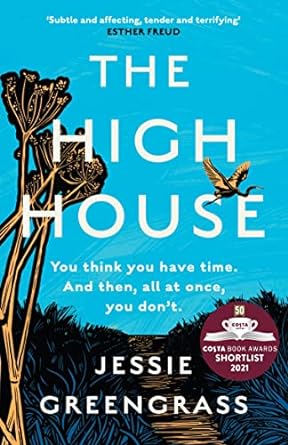The March book choice for SWFT was a bit of a change from our usual fare. Marple is a collection of short stories by 12 different authors, with the central figure of Agatha Christie‘s Miss Marple linking the tales.
Miss Jane Marple (as described by Christie) is an single elderly lady with blue eyes. She lives in a village called St Mary Mead, and enjoys knitting and is a gentle (genteel) gossip. She is an excellent student of human nature, and although not a professional detective, her skill lies in identifying culprits by linking their behaviour to previous incidents. Christie’s first Miss Marple book was Murder at the Vicarage, but she also appears in several short stories in The Thirteen Problems.

It was a bit of a surprise to find not all the authors in this collection were crime writers – although the publisher information did mention the authors writing from their own perspective. These short stories were all written by female writers, some of whom are known for their crime, mystery, and psychological thrillers but others for their science fiction, YA fantasy, history, and contemporary romance. They seemed like an odd choice, and one person suggested that they might all work for the same publisher which seems plausible. However unlikely a setting for Miss Marple some of the stories might be, they were all approved by Agatha Christie Limited, the company created by the writer herself and now chaired by her great grandson.
Not all of our group were familiar with Christie – several said that they hadn’t come across her before, and probably wouldn’t seek her out. I should probably admit that I am an Agatha Christie fan, and have read (and own) all her crime novels. So I had been really looking forward to reading this collection, and the group agreed it was interesting seeing the different approaches of the writers.
The idea of a short story collection appealed to some of our group, as they felt more able to dip in and out of the stories. Others weren’t too keen and said that none of the stories had particularly grabbed them. One member described them as a pleasant diversion, and others said that a couple of the stories might have worked better as a novel, such as The Open Mind by Naomi Alderman. This story was set at an Oxford college and gave an insight into the politics of academia. Several members enjoyed this but commented that the ending felt rather rushed. Christie herself rewrote some of her short stories into novels. One reader said Marple was the perfect book for her – good old fashioned murder [in] bite sized chunks.
The stories were all quite different – in one, Miss Marple is on a cruise, another is set in America, although some are set in her village home of St Mary Mead. Each author took Miss Marple and put her into their own worldview, and some of these worked better than others – a couple of the stories felt a bit forced. In one, Miss Marple was doing Tai Chi, which does feel rather unlikely – possibly more so than her being in New York in the first place.
The story by Val McDermid (The Second Murder at the Vicarage) was very atmospheric, and re-introduced characters from Christie’s original Murder at the Vicarage. This story felt as though it could be a TV adaptation without any trouble, and was easy to visualise. Leigh Bardugo’s story (The Disappearance) was similar in containing characters from previous Christie novels, but had a slightly unlikely ending which proved a bit disappointing for some members. The descriptions in this story were quite vivid – one staying in the mind of a group member for several days:
“He wore disreputable trousers and some kind of blue chambray shirt. The effect was both unsavoury and artistic – and exactly his aim, Miss Marple suspected.” (Leigh Bardugo, The Disappearance)
The final verdict? We would recommend some of the stories in Marple, but not all of them. It is an interesting way of introducing Miss Marple to a new generation, but it didn’t necessarily work in all cases. To get beneath the skin of Miss Marple, the simplest way is to read her in the original.

Our book for April is The High House by Jessie Greengrass.
Shortlisted for the Costa Best Novel Award, and described being “Elegant, resonant” by The Times, and “Suffused with joy” by The Guardian, this is a story exploring a moment in time:
Perched on a hill above a village by the sea, the high house has a mill, a vegetable garden and a barn full of supplies.
Caro and her younger half-brother, Pauly, arrive there one day to find it cared for by Grandy and his granddaughter, Sally. Not quite a family, they learn to live together, and care for one another.
But there are limits even to what the ailing Grandy knows about how to survive, and, if the storm comes, it might not be enough.
If you want to come along to our next Reading Group, you’re welcome – we will be meeting at 1pm on Wednesday 17th April. Copies of the book are available from the library, so pop in to get your copy.
If you like the look of The High House, or are interested in anything else we’ve read, why not take a look at our other book reviews here? Or find out more about our Reading Groups here
